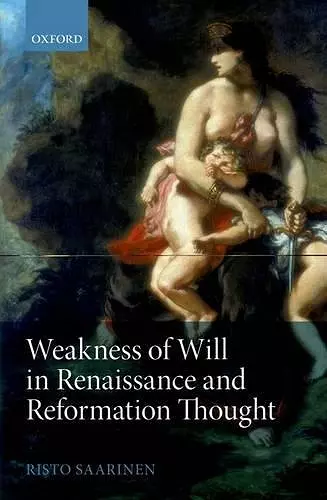Weakness of Will in Renaissance and Reformation Thought
Format:Hardback
Publisher:Oxford University Press
Published:30th Jun '11
Currently unavailable, and unfortunately no date known when it will be back

Weakness of will, the phenomenon of acting contrary to one's own better judgment, has remained a prominent discussion topic of philosophy. The history of this discussion in ancient, medieval, and modern times has been outlined in many studies. Weakness of Will in Renaissance and Reformation Thought is, however, the first book to cover the fascinating source materials on weakness of will between 1350 and 1650. In addition to considering the work of a broad range of Renaissance authors (including Petrarch, Donato Acciaiuoli, John Mair, and Francesco Piccolomini), Risto Saarinen explores the theologically coloured debates of the Reformation period, such as those provided by Martin Luther, Philip Melanchthon, John Calvin, and Lambert Daneau. He goes on to discuss the impact of these authors on prominent figures of early modernity, including Shakespeare, Descartes, Spinoza, and Leibniz. While most of the historical research on weakness of will has focused on the reception history of Aristotle's Nicomachean Ethics, Saarinen pays attention to the Platonic and Stoic discussions and their revival during the Renaissance and the Reformation. He also shows the ways in which Augustine's discussion of the divided will is intertwined with the Christian reception of ancient Greek ethics, and argues that the theological underpinnings of early modern authors do not rule out weakness of will, but transform the philosophical discussion and lead it towards new solutions.
[T]he book remains a most valuable contribution to an important issue in a very large field of authors and texts yet to be fully explored and explicated. * Journal of the History of Philosophy *
The book reviews an interesting and compelling repertoire of scholars from antiquity to the Reformation ... The study sheds light on a topic of great significance in early modern Europe. * Ocker, Archive for Reformation History Vol. 41 *
Saarinen's analyses are clear and cogent throughout the book ... It is a measure of Saarinen's superb handling of this heterogeneous material that he acknowledges the philosophical insufficiency of some of it ... and still finds very instructive ways to use these texts in order to shed considerable light on their relevance to the theory of action and the moral psychology involved in weakness of will. In a convincing manner, Saarinen has certainly charted a lot of territory previously more or less unknown to the scholarly discussions on weakness of will in a historical perspective. As with his first book on the subject, this will hopefully prove a ground-breaking enterprise soon to be followed by other scholars in the area of early modern thought. * Jörn Müller, British Journal for the History of Philosophy *
Saarinen provides a fascinating and in-depth study relevant to philosophical and theological anthropology, as well as to the Christian discussion of hamartiology. His nuanced treatment also breaks down the dichotomies that older scholarship posited between philosophy and theology, Renaissance and Reformation, humanism and scholasticism. It highlights the creative and eclectic nature of this intellectual period. * Keith D. Stanglin, Notre Dame Philosophical Reviews *
Saarinens book represents fine research on the notion of akrasia in Reformation thought.
ISBN: 9780199606818
Dimensions: 238mm x 171mm x 22mm
Weight: 540g
258 pages